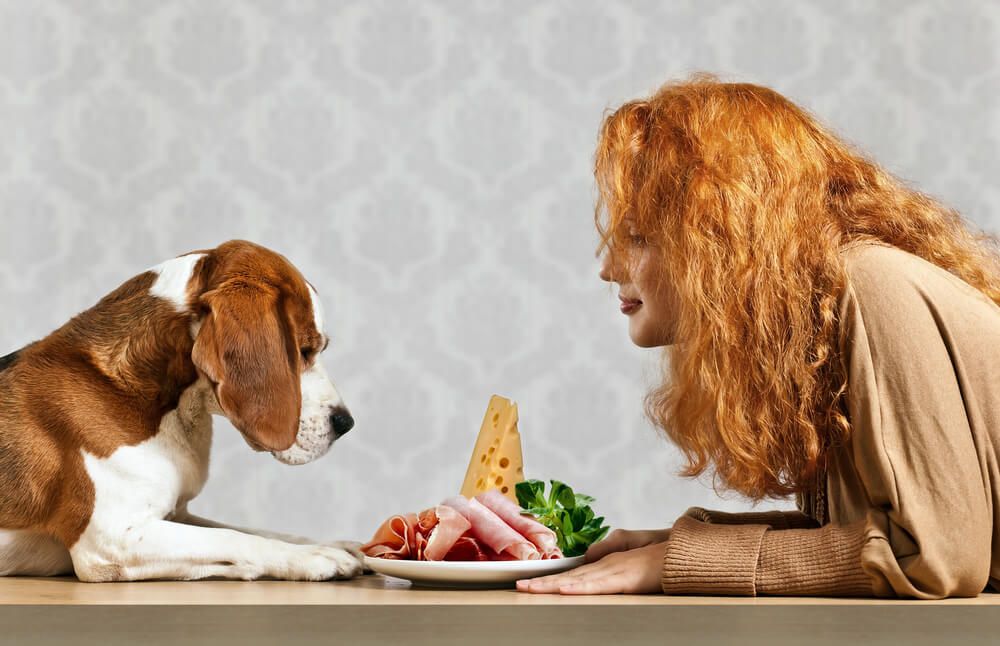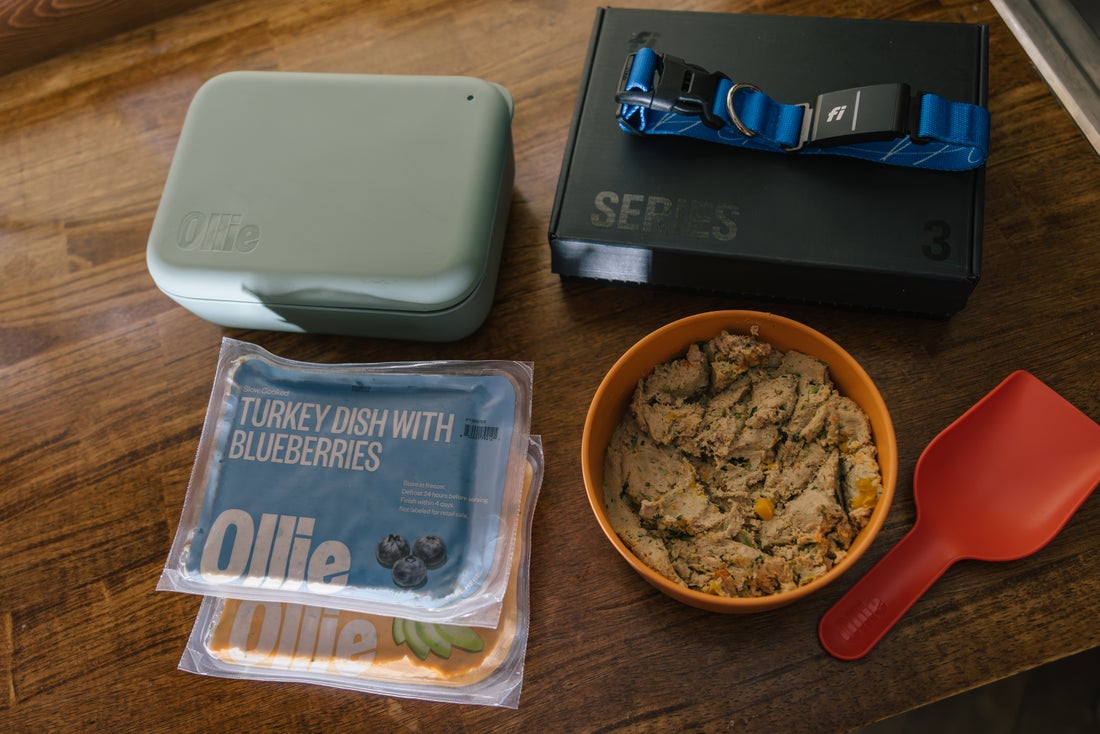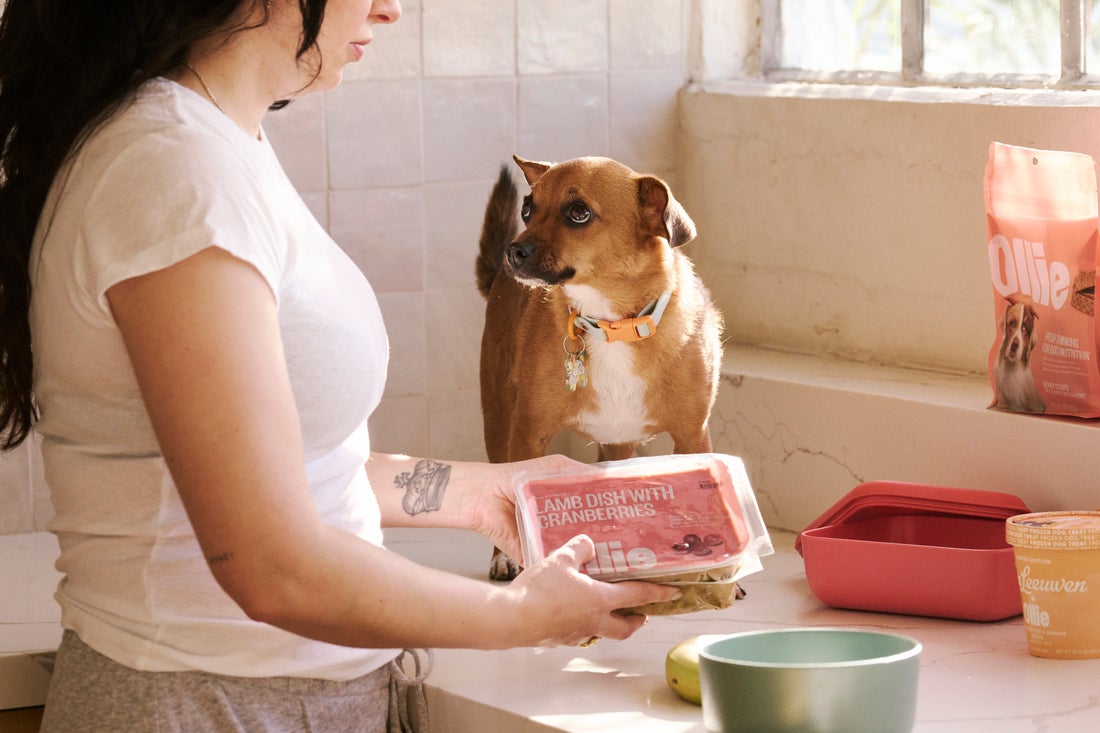Hey Ollie blog readers! We’re offering you an exclusive 60% OFF your starter box! Try now!
When it comes to supporting a healthy weight for your dog, most online resources focus on preventing weight gain or strategies to help overweight pups slim down. Although canine obesity is a more prevalent issue—affecting 59% of U.S. dogs in 2022—underweight pups face an equally harmful health challenge.
While increasing your underweight pup’s portion size may help them put on much-needed pounds, it must be done thoughtfully to ensure safe and effective results. If your dog is looking lanky and needs help “filling out,” here are some insights on potential causes as well as tips and tricks to ensure safe, healthy, and appropriate weight gain.
Tips for Helping Your Dog Gain Weight
Track Your Pet’s Calorie Intake
If your pet is unable to maintain a healthy weight, it’s helpful to keep a food diary for a few days or weeks to determine if they are eating a reasonable amount of calories for their body weight. Using a standard measuring cup or food scale, measure food offered and then re-measuring what’s left each day. This can give your veterinarian more information about the root cause of weight loss.
Add Fresh Foods
Supplementing your dog’s regular diet with fresh food ingredients can give you more control over your dog’s protein, fat, and nutrient consumption. Incorporating high-protein, high-calorie foods such as eggs and plain chicken can be an excellent way to encourage a healthy appetite and help your pup gain the necessary weight.
Fresh dog food delivery services such as Ollie make it easy to feed your dog human-grade ingredients without fear of nutrient imbalance. Each recipe is tailored to canine nutritional needs, delivering a complete and balanced portion at every meal and a strong foundation of health for your dog.
While we believe fresh foods are best fed daily, this kind of supplemental feeding may be extra important during times of growth or increased activity when your pup’s energy demands are high. Ollie personalized meal plans are a great way to ensure your dog’s daily diet aligns with their age, activity level, and health at every life stage.
Include Meal Toppers
Adding specially formulated meal toppers and supplements designed to promote healthy weight gain can boost your dog’s nutrition and stimulate their appetite by adding variety and interest to their bowl. In addition to powdered or liquid mix-ins, fresh dog food such as Ollie can be an effective topper. Ollie features several meal plan options that are a convenient and healthy way to add excitement—and necessary nutrition—to your pup’s plate. Dogs who prefer a satisfying crunch will appreciate Ollie’s Baked dog food options, while the Half Fresh Plan serves up wholesome Ollie meals in smaller portions, perfect for topping your dog’s usual meals.
Increase Meal Frequency
If your dog isn’t finishing their once or twice-daily meals, consider splitting their daily portion into several small meals served throughout the day. Alternatively, if you’re only feeding your adult dog once a day, try leaving dry food out so they can graze throughout the day. But do not leave wet or fresh dog food out for a prolonged period, as these formulas can spoil and may lead to illness or a more significant food aversion.
Introduce More Exercise
Exercise isn’t just for losing weight, healthy physical activity can also promote muscle development and weight gain. If your dog is displaying good energy and is deemed healthy by their veterinarian, try increasing their physical exercise. For best results, select an activity that requires steady effort, such as jogging, swimming, hiking, or hill walking, rather than short-burst activities such as fetch. Sustained activities such as these are generally low impact and a great way to build healthy muscle.
In addition to promoting healthy body condition, consistent exercise encourages a hearty appetite. Ensure that when you increase your dog’s exercise, you’re also prepared to increase their meal portion and protein intake to satisfy their body’s increased needs.
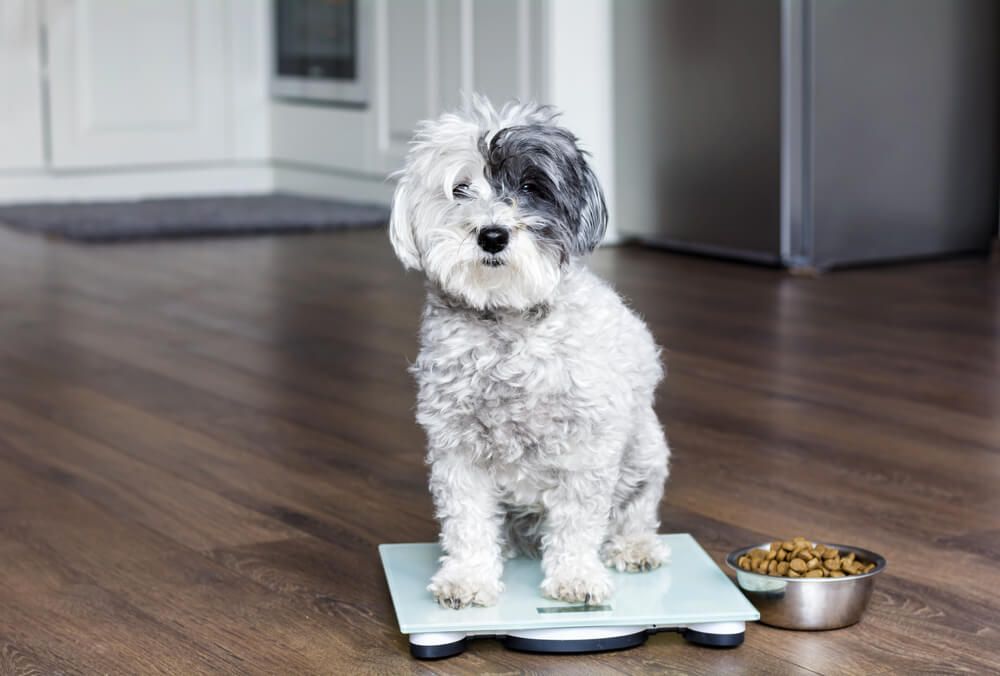
Get started with healthy personalized meal plans!
Reasons Your Dog May Be Underweight
Picky Eater
Your dog’s picky eating can be caused by a variety of factors including anxiety, dental pain, and illness. If your pup has received a clean bill of health from their veterinarian but still refuses to eat consistently, it may be difficult to ensure they receive the nutrition they need. For starters, try topping your dog’s kibble with balanced wet or fresh dog food. Consider trying a few of Ollie’s recipes to see if there are any proteins your pup enjoys. In addition to flavor preference, pups with sensitive stomachs may prefer easier-to-digest proteins such as chicken, turkey, or lamb. You can further enhance your pup’s dish—and increase their hydration—by adding homemade bone broth to the mix.
Stress or Anxiety
Like people who suffer from chronic stress, anxious, nervous, or stressed dogs may experience elevated metabolism, gastrointestinal upset (e.g., nausea, loose stool), and decreased appetite, causing them to lose weight. To address stress-related weight problems, you’ll need to identify and manage your pup’s stress—which may be easier said than done.
Stressors will vary from dog to dog, but common causes include:
- Routine or schedule changes
- Relocation
- New or missing human or pet family members
- External triggers (e.g., stray or loose pets outside, loud noises)
- Physical discomfort (e.g., pain from punitive training methods, illness, or disease)
- Unpredictability
If your dog is nervous, anxious, or exhibiting uncharacteristic behavior or personality changes, consider working with your vet, a veterinary behaviorist, or a professional trainer to help you identify and address your pup’s stress.
Illness or Injury
Persistent weight or appetite loss in dogs can indicate various illnesses ranging from chronic digestive problems and food sensitivities to metabolic disorders and some types of cancer. Dental disease and injuries to your dog’s oral cavity can also cause chronic pain, causing dogs to eat less or stop eating altogether. If your dog’s appetite or body condition inexplicably changes, schedule an appointment with their regular veterinarian. This is especially important if your dog’s weight changes are accompanied by other signs such as lethargy, drooling, decreased thirst, vomiting, diarrhea, or fever.
Old Age
As dogs reach their geriatric years, it can be more difficult to maintain a healthy body weight. Older animals are less efficient at digesting and absorbing some nutrients, which can lead to weight loss. In addition, age-related issues can prevent your otherwise healthy senior dog from gaining weight or maintaining a healthy body condition. For example, dental disease can make it painful for your dog to pick up or chew their food, resulting in decreased food intake and weight loss. An Ollie dental health screening is an easy and convenient way to determine if your dog is suffering from dental disease and if a veterinary follow-up is necessary. In addition to dental discomfort, arthritis in your senior dog’s neck, spine, or elbows may make it difficult to bend down and eat from a bowl on the floor.
After a veterinary health exam to rule out or address underlying discomfort, consider feeding your sweet senior a softer food formulation, such as Ollie Fresh Recipes, or serving them from an elevated feeding dish. In addition to making mealtime pleasant, these small adjustments may promote more consistent eating and a healthy body condition.
Malnutrition
If you have recently rescued a dog through a shelter or rescue group and your new dog was found as a stray or removed from an abusive or neglectful situation, your dog’s poor condition may be caused by malnutrition. Gather as much information as you can from any veterinarians who cared for your pup before adoption and work with your veterinarian to help your new best friend reach their full health potential.
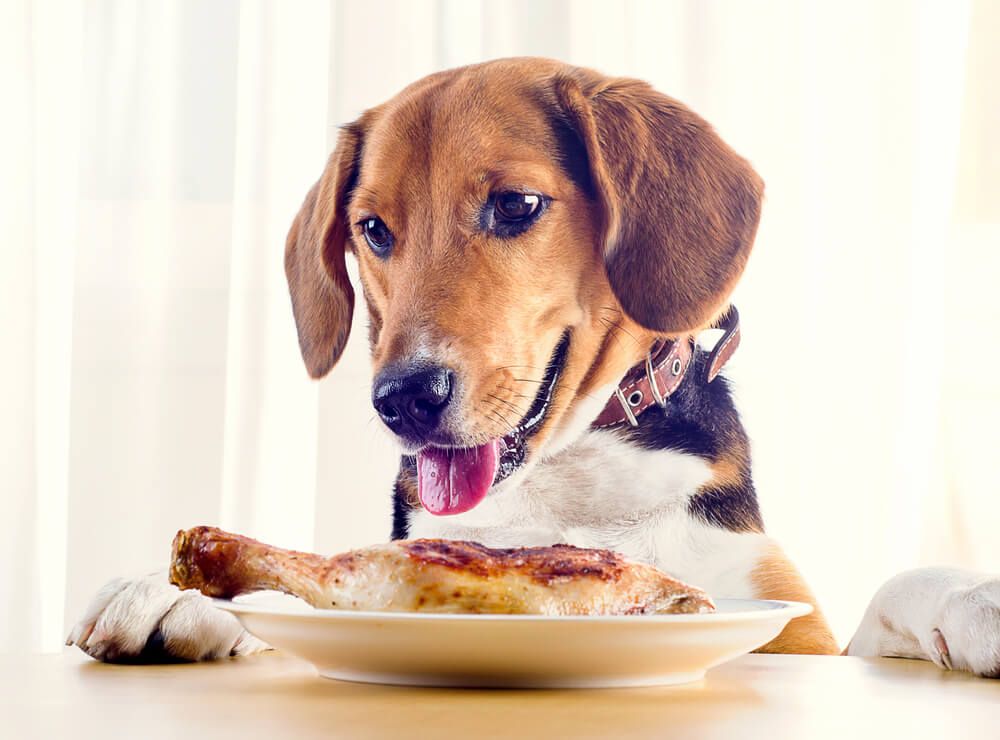
Healthy Weight Gain Recipes for Dogs
While treats should always be given in moderation, homemade dog treats containing nutritious ingredients can be an excellent way to promote healthy weight gain while also providing protein, complex carbohydrates, and other valuable nutrients. Pup-pleasing recipes that include peanut butter, sweet potatoes, pumpkin, and coconut oil are a fun and safe way to indulge your dog, increase their caloric intake, and help them enjoy better health.
Dog Still Not Gaining Weight? Time for a Visit to the Vet
If your dog doesn’t respond to the diet and lifestyle adjustments described above, it’s time to visit the vet and ensure they aren’t suffering from an underlying condition. Various minor and major health problems—ranging from internal parasites to digestive disorders—can affect your dog’s body condition, making them appear thin or unthrifty. In addition to a physical exam, your veterinarian may recommend additional screening tests such as fecal testing, blood work, or parasite screening to rule out medical causes.
Your dog’s weight is about far more than how they look on the outside. Being overweight or underweight can cause significant health issues and compromise your pup’s well-being. Dogs who aren’t well nourished may lack the energy to lead a happy and healthy life, while a pup who’s fueled by a healthy nutritious diet will have an appetite for life and the energy to run, play, and bring joy to everyone around them. Unsure if your dog’s weight is ideal? Receive actionable information about your pup’s body condition with the Ollie Weight Screening.


Healthier ingredients,
tailored recipes, delivered
Get 50% of your first box of Ollie’s fresh
delivered meals today!
The Ollie blog is devoted to helping pet parents lead healthier lives with their pups. If you want to learn more about our fresh, human-grade food, check out MyOllie.com.
Tagged As:

The nutrition your dog needs,
the food they want.

Enjoying our articles? Subscribe our Newsletters and get new articles directly to your inbox
You might also like
18 September 2025
4 MINS READ
Is Fresh Dog Food Easier to Digest?
Yes, fresh dog food is generally easier for dogs to digest than highly processed kibble. Because it’s made with whole ingredients, gently cooked, and free from unnecessary fillers, fresh food supp…
by Ollie Pets
18 September 2025
5 MINS READ
Can I Rotate Fresh Dog Food Flavors?
Yes, it’s safe to rotate fresh dog food flavors, and many dogs actually benefit from the variety. At Ollie, we offer multiple fresh recipes, like Beef, Chicken, Turkey, Lamb, and Pork so you can…
by Ollie Pets
18 September 2025
5 MINS READ
Is Fresh Dog Food Safe During Power Outages?
Fresh dog food is only safe during a power outage if it has stayed cold, specifically, below 40°F. Once the temperature rises above that point, bacteria can start to grow, and the food may no lon…
by Ollie Pets
